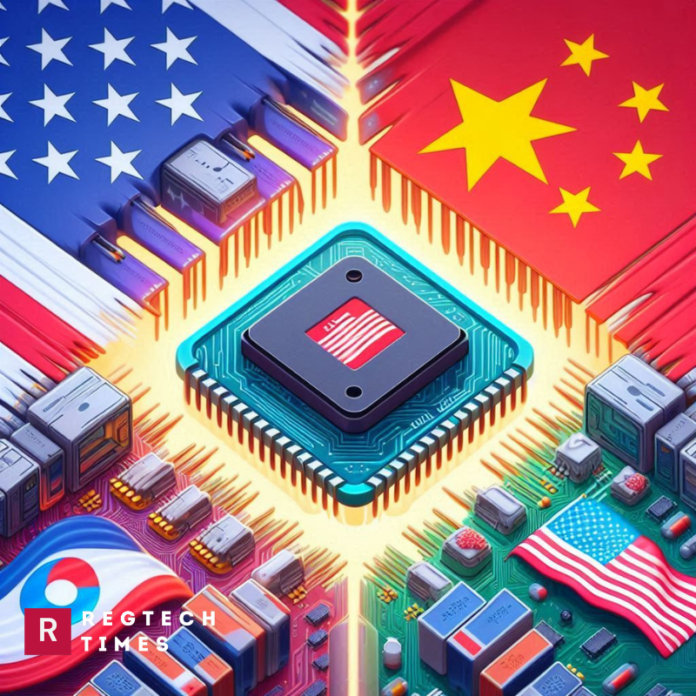In recent years, the intersection of global technology and geopolitical tensions has led to a series of stringent regulations and sanctions aimed at curbing the transfer of advanced technologies to potentially adversarial nations. Among these measures, the US government’s sanctions against Chinese tech companies have been particularly notable, especially those targeting advanced artificial intelligence (AI) chips.
One high-profile example involves TikTok, owned by ByteDance, and its unexpected collaboration with Oracle. This article delves into how TikTok was sanctioned, the role of Oracle in helping it evade these sanctions, and the broader implications of these actions.
Sanctions Against TikTok: A Brief History
TikTok, the immensely popular social media platform known for its short video format, has been under intense scrutiny by US authorities. Concerns about data privacy, national security, and the app’s ties to the Chinese government have driven much of this attention. In 2020, former President Donald Trump attempted to ban the app in the United States, citing national security risks. This move was part of a broader strategy to counteract China’s growing technological influence and to protect American users’ data from potential misuse by Chinese authorities.
While the ban faced legal challenges and was eventually blocked, the scrutiny did not end there. In 2022, the US government imposed a ban on the sale of advanced AI chips, including Nvidia’s H100, to China. These chips are critical for training sophisticated AI models, which could have military or surveillance applications. This sanction was a part of the broader effort to maintain technological superiority and prevent advanced AI technology from bolstering China’s capabilities.
US Restrictions on AI Chips is Innovative Mechanism of Sanctions on China
Oracle’s Strategic Maneuvering
Despite these sanctions, reports have emerged indicating that Oracle, a leading American technology company, has found a way to provide ByteDance with access to these advanced AI chips. Oracle has allegedly been renting out servers equipped with Nvidia’s H100 chips to ByteDance within the US, effectively allowing TikTok to leverage powerful AI capabilities without directly violating the export ban.
Nvidia Sanctions: Impact on Chinese Distributors and the Rise of Domestic Alternatives
This practice exploits a significant loophole in the regulations. The chips are not being exported to China; instead, they remain within the United States, where ByteDance can access them via rented servers. This arrangement technically adheres to the letter of the law but undermines its spirit, which aims to restrict Chinese access to advanced AI technology.
The CHIPS Act of 2022: Revitalizing the U.S. Semiconductor Industry Defying Global Competition
The “Project Texas” Initiative
ByteDance has tried to address US security concerns through an initiative known as “Project Texas.” This project aims to isolate TikTok’s US operations from its Chinese headquarters, ostensibly to ensure that American user data is not accessible to Chinese authorities. However, former ByteDance employees have criticized this initiative as largely superficial. They claim that significant interactions still occur between the US and Beijing-based teams, suggesting that the separation is more of a public relations move than a substantive change.
US TikTok Ban: House Passes Bill to Force Sale or Shutdown
Broader Implications and Industry Response
The revelation that Oracle is aiding ByteDance in this manner has broader implications for the tech industry and US regulatory efforts. Other Chinese tech giants, such as Alibaba and Tencent, are reportedly considering similar arrangements with Oracle. These companies, which own US-based data centers, might find it even easier to exploit these loopholes, potentially bypassing the need to rent from American firms altogether.
China Defiantly Unfazed by AI Chip Sanctions Imposed by US, Sets Up $47.5 Billion Fund
Not all US companies are willing to engage in such practices like Oracle. Some smaller American cloud providers have reportedly declined ByteDance’s offers to rent Nvidia’s H100 chip-equipped servers, citing concerns about violating the spirit of US chip restrictions. This divergence in responses highlights the ethical and business dilemmas faced by tech companies in navigating complex international regulations.
Nvidia Sanctions: Impact on Chinese Distributors and the Rise of Domestic Alternatives
Regulatory Challenges and Future Directions
The US Commerce Department is aware of these practices and has proposed a rule to address the issue. This rule would require US cloud providers to verify the identities of foreign customers and report if they are training AI models potentially used for malicious purposes. However, many cloud providers have opposed this proposal, arguing that the additional requirements would be burdensome. As a result, the proposed rule is currently in limbo.
Even if this loophole is closed, it may not fully prevent Chinese companies from accessing advanced AI technology through their US-based operations. This ongoing challenge for US regulators underscores the difficulty of balancing business interests with national security concerns in a highly interconnected global economy.
Intel’s CEO Pat Gelsinger recently warned US that AI chips sanctions are likely to backfire.
The case of TikTok, Oracle, and the evasion of US sanctions on advanced AI chips illustrates the complexities and challenges of enforcing technology restrictions in a globalized world.
While the US government continues to seek ways to curb the transfer of critical technologies to China, innovative and legally ambiguous strategies by companies on both sides present ongoing regulatory hurdles. As the geopolitical landscape evolves, so too must the strategies and frameworks designed to safeguard technological advantages and national security.


